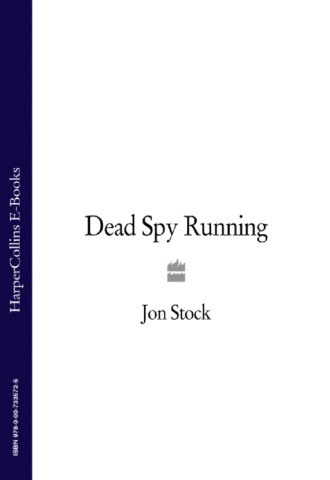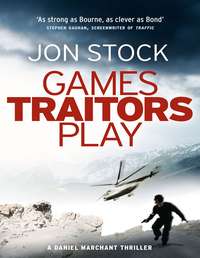
Полная версия
Dead Spy Running

Jon Stock
Dead Spy Running

For Hilary
Therefore I lie with her and she with me,
And in our faults by lies we flatter’d be.
William Shakespeare
Contents
Epigraph
1
A bright Blackheath morning and it was already hot, too…
2
It took ten minutes for Marchant to find Pradeep again.
3
Paul Myers was unpicking encrypted emails and eating his fourth…
4
Daniel Marchant looked out across the shallow valley and watched…
5
Paul Myers drew heavily on his third pint of London…
6
Marchant watched from his bedroom in the safe house as…
7
Marchant knew that someone was in his room as he…
8
It was a long-held custom that the first half of…
9
Later that day, Fielding accepted Chadwick’s offer of a sharpener…
10
Leila headed back to London that night, leaving Marchant to…
11
The gang of Year Five boys in the corner of…
12
The undisputed waterboarding world champion was Khalid Sheikh Mohammed. Marchant…
13
Nine hundred miles west of Poland, Marcus Fielding took a…
14
Leila turned the key in the front door and slipped…
15
For a moment, Marchant wasn’t sure if the explosion was…
16
After a bone-breaking, hundred-mile drive through the Polish countryside, Marchant…
17
Marchant knew that the best legend for a spy was…
18
Sir David Chadwick had spent a lifetime brokering compromises in…
19
Hassan was the only asset Leila had ever slept with.
20
Spiro didn’t like the CIA sub-station in Warsaw. He didn’t…
21
Marchant lay on the bed, watching Monika as she undressed…
22
Leila had met Jago, a tousle-haired six-year-old, once before, but…
23
Spiro looked again at the grainy image of a two-tonne,…
24
Six miles south-west of the shopping mall, Daniel Marchant sat…
25
Prentice sent the pre-written text while his hand was still…
26
Daniel Marchant pushed open the blue door, not sure what…
27
‘It was a precaution, Marcus, nothing more,’ Sir David Chadwick…
28
After twenty-four hours in India, Daniel Marchant concluded that he…
29
It was Alan Carter’s first visit to Legoland, but after…
30
Leila took it as a very public expression of gratitude…
31
Marchant felt the weight of a body lying on top…
32
‘Can we assume that Marchant was at the club?’ Fielding…
33
In another life, a different time, Marcus Fielding and William…
34
Paul Myers had been drinking heavily all evening in the…
35
Marchant heard the police before they reached his carriage. He…
36
Fielding had ordered his driver to turn round and head…
37
Marchant stood in the shade of a stall selling strings…
38
Fielding’s office clock said 7.30 a.m.
39
Marchant listened to the rustle of the necklaces slung loosely…
40
Paul Myers hadn’t been hit so hard since he was…
41
Fielding lifted the flute to his lips and began to…
42
Leila listened as Monk Johnson finished running through the itinerary…
43
There was something about the network of cave-like huts on…
44
Fielding put down the phone and looked around the room,…
45
‘Sons turn out in the strangest ways,’ Carter said. ‘My…
46
William Straker sat back in the DCIA’s office in Langley,…
47
Marchant heard the mobile phone begin to ring moments before…
48
Marchant lifted his head towards the cell door and listened…
49
‘The Prime Minister was adamant that you shouldn’t be killed,’…
50
Dhar watched the rickshaw driver’s legs seesaw through the Chandni…
51
Straker took the call in one of the small private…
52
Marchant couldn’t decide if it was a good or bad…
53
Salim Dhar brought the US President into focus with the…
54
‘As far as we’re concerned, she took the bullet that…
55
Marchant stood outside Legoland, on the Thames path, looking across…
Acknowledgements
About the Author
By the same author
Copyright
About the Publisher
1
A bright Blackheath morning and it was already hot, too hot for twenty-six miles. Daniel Marchant scanned the crowd and wondered again why he was about to run a marathon. Thousands of people were stretching in the early sunshine, massaging limbs, sipping at water. It was like the stillness before battle. A woman in a baseball cap strapped an iPod to her arm; the man beside him tied and retied his laces. Another runner poured water over his hair and shook it like a dog, droplets catching the light. Whatever it takes, Marchant thought. In his case, too much Scotch the night before and not enough training.
‘One last try,’ he said, turning to Leila. She was sitting on the grass, leaning back on her hands, staring straight ahead. Why was she taking it so seriously, he thought, as he strolled over to join a long queue for the Portaloos. If the going got tough, they could walk, enjoy the day out. Wasn’t that how she had sold it to him? But he knew that would never happen: they would crawl before they walked. It was a stubbornness they shared, a bloody-mindedness he could sometimes do without.
He inched forward in the queue. The sweet smell of Deep Heat hung heavy in the spring air, reminding Marchant of school changing rooms, the similar imminence of pain. He always felt like this before they went out running in Battersea Park, only for his resentment to subside when the endorphins kicked in; that and the sound of her rhythmic breathing, her easy footfall. He still wondered why he was about to run twenty-six miles, though, and at such short notice. Their longest training run had been the weekend before, eighteen miles down the towpath to Greenwich and back. But how could he have said no when he barely realised she was asking him? That was her job, after all: persuading people to do what they shouldn’t, to say what was meant to remain unsaid.
After queuing for five minutes, Marchant changed his mind and returned to Leila, who had stripped down to her running kit. From the day they had first met, he had promised himself not to fall in love with her, but she had never made it easy. Today was no exception. Her limbs were long, but she touched her toes with ease, shorts tightening against toned muscles. He looked away at the hot-air balloons behind her, swaying in the gentle breeze, desperate to rise up into the brilliant blue sky. In front of them lorries were parked up like a military convoy, piled high with runners’ plastic bags, ready to be transported across London to the finish line.
Marchant took both their bags and handed them in to a marshal. He tried to imagine how he would feel when they were reunited with them again, three, more like four, hours later. Despite his protests, he knew that it was the right thing to be doing. The training, however inadequate, had kept him sane during the last few weeks, helping him to focus on what must be done.
‘Too many people,’ Leila said, pushing hair out of her eyes as Marchant rejoined her. He noticed she was holding her mobile phone. He followed her gaze over towards the main start, where an army of 35,000 runners was now massing. Afterwards, he thought, the dead and the wounded would be laid out in St James’s, wrapped in shiny foil.
‘It’ll be fine, a stroll in the park,’ Marchant said. ‘Just like you promised.’ He put a hand on her shoulder as he stretched one calf muscle, searching her large eyes. It was a hint of the exotic that had first attracted him, the dark, lustrous hair, her olive skin. ‘You’re not nervous, are you?’ he asked, trying to sound bullish. There was suddenly something distracted about her, an unsettling distance. She was usually so upfront, eye to eye.
‘Not about the running,’ she said.
‘What, then?’
‘Cheltenham picked up some chatter last night,’ she said quietly, looking around.
‘About the marathon?’ Marchant kept his hand on her shoulder, face close to hers, stretching the other calf. Leila nodded. ‘Now you tell me.’
‘And you know I shouldn’t,’ she said, pushing him away. ‘Paul’s just called, heard I was taking part.’
‘Paul? What’s he monitoring these days? Runners’ World chatrooms?’
‘Come on, Daniel. You know I can’t.’
Marchant had been out of MI6 for two months now, suspended on his case officer’s full pay. Leila knew how angry he still felt about everything that had happened: his father’s death, the rumours that wouldn’t go away. She knew the toll it was taking on his health, too, the late, solitary vigils at the pub. Marchant’s youthful features were tiring around the eyes, a greyness starting to fleck his dirt-blond hair. He was only twenty-nine, but sometimes, in a certain light, Leila looked at him and thought she saw his father.
‘Remember not to go too fast at the beginning,’ she said, changing tack as they jogged over to join the crowded start. Leila still worked for MI6, although she often wondered why. The Service was slowly killing them both.
‘That shouldn’t be a problem.’ Marchant surveyed the sea of people around him, more carefully now. ‘Remind me why we’re doing this?’
‘Because you love running and because you love me.’ Leila brushed her lips against his cheek as a helicopter arced across the South London sky. ‘More than you should.’
She had never kissed him like that before. Earlier she had woken him very differently, pulling him up through the languid hours of dawn with a passion that had almost frightened him.
‘Shouldn’t we be saving our energy for the marathon?’ he had whispered afterwards, the rising sun filtering through the blinds of her Canary Wharf apartment. His eyes ached at the thought of all that daylight.
‘My mother always told me to live each day as if it was the last.’
‘My dad used to say something similar, only in Latin.’
She lay with her head on his chest, eyes open, stroking his stomach. A police siren faded somewhere near the Thames.
‘I’m so sorry about your father.’
‘Me too.’
Later he had found her in the kitchen, stirring a saucepan of porridge for them both as she looked out of the window towards the O2 Dome. There was an empty bottle of whisky on the granite-top island, next to a couple of stacked dishes from the previous night and the remains of a big bowl of pasta. He pedalled the chrome bin and quietly slid the bottle in, his eyes on Leila. She was wearing knickers and an old London Marathon T-shirt with a slogan on the back: ‘Never again…until the next time’. The whisky had been a mistake, he realised that now. The next time he would realise earlier. The pain behind his eyes was spreading.
‘What’s this?’ he asked, picking up a single sheet of paper from the island.
She turned, and then looked back out of the window. ‘You’ve never really been religious, have you?’ she asked.
‘Hey, I was a Sufi once, in my year off in India.’
‘Who wasn’t?’
‘Is this a Bahá’í thing?’
‘It’s not a thing, it’s a prayer. My mother used to make me say it every morning, before I went to school.’
Leila wasn’t particularly religious either, but she had grown interested in her mother’s Bahá’í faith in recent months. Marchant’s own knowledge of it was patchy, based on an internal MI5 briefing that had crossed his desk about Dr David Kelly, the weapons inspector and Bahá’í member who had been found dead in a wood in Oxfordshire.
He looked at the sheet again, and read a passage of the prayer out aloud: ‘“Armed with the power of thy name, nothing can ever hurt me, and with thy love in my heart, all the world’s afflictions can in no wise alarm me.” Is it reassuring?’
‘She said it would protect us.’
Marchant thought he could do with a little protection now, as he looked up at the blur of helicopter blades above Blackheath. He suddenly felt claustrophobic, pressed down upon from above as well as from all sides. There was no room for personal space any more, normal rules of behaviour no longer applied. A runner next to him fumbled at his shorts with an empty plastic drinking bottle. Another hung his head, clearing one nostril, then the other. Somebody else yelled with joy (or was it fear?). The crowd responded, calling back like restless animals. They were all part of the larger herd now, surging forward as one towards the start line.
Marchant instinctively flexed his elbows as people pushed in, trampling on his old running shoes. For a few seconds he lost Leila, then he spotted her again, five yards ahead, turning back to look for him. Despite himself, he loved her more than ever in that fleeting moment, her beauty framed by a thousand strangers. He moved up alongside, squeezed her hand. She smiled back, but her look was far away. The call from Paul Myers had unsettled her.
Above them two helicopters now circled, the drone of their blades more menacing than ever. There was a new sound, too, top notes cutting through the background noise. Marchant couldn’t work out what it was at first, but then he realised. Runners everywhere were synchronising and calibrating, making final adjustments to their bleeping stopwatches and heart monitors. He glanced instinctively at the hands of his own silent watch. In the same instant, the starter’s klaxon hooted, oddly hesitant, an uncertain call to arms. The only thing Marchant could do was run.
It was fifty minutes into the marathon that Marchant first noticed him, tucked behind a small knot of runners twenty yards ahead. The man–Asian, mid-thirties, fragile frame, heavy glasses–was moving at a similar pace to them, but looked uncomfortable, stumbling on the cobbles as he rounded the bow of the Cutty Sark. He was sweating profusely, too, even for this heat; but it was the belt around his waist that had caught Marchant’s well-trained eye.
Leila’s talk of Cheltenham had put Marchant on edge, reawakening old skills. The world around him was suddenly full of threats again, of brush passes and dead drops, and the belt troubled him. It consisted of a number of pouches, each one containing an isotonic energy drink. The drinks were in soft, bulging cartons, silver with small orange screwcaps. He’d seen other runners loading up with drinks belts at the start, but none with so many pouches.
It was just a precaution on a hot day, Marchant told himself, lengthening his stride. Running had always come naturally to him, a benefit of being tall. He caught up with the group as they left Greenwich for Deptford, heading down Creek Road. The crowds were thinner here, but still noisy, heckling runners with the names they had written on their vests. ‘Where’s Grommit?’ someone shouted, as a fun-runner dressed as Wallace ran past. ‘Go Dan!’ two young women screamed. For a moment, Marchant thought they must be supporting someone else, but then he remembered Leila had insisted on writing ‘Dan’ on the front of his own running vest. He turned his head to take another look but they were already lost in the crowd, cheering on other strangers.
‘What are you doing?’ Leila called out from behind Marchant. ‘We were doing fine.’
‘Give me a minute,’ he said. The group of runners ahead of the man also bothered him. Two were heavily set, struggling in the heat and bearing all the unsubtle hallmarks–bulging vests, GI One haircuts–of the American Secret Service. The third man was lean and sinewy, a born runner. He looked familiar.
As Marchant drew near, he knew at once that something was not right. He could taste it in his mouth, like corked wine. His father had always taught him to trust his instinct, whether it was a bad feeling on first meeting a potential agent or pulling out of a rendezvous for no other reason than that it felt wrong. It wasn’t tradecraft; it was more visceral than that.
Marchant positioned himself as close as he could behind the man, trying to get a better look at the belt, but the running field was still tightly packed. He counted six drinks pouches. They were eight miles into a hot race, but none of the pouches had been opened.
Then he noticed what looked like an oversized watch on the man’s wrist. Leila had something similar for long runs. It was a basic GPS receiver, relaying her position, speed and when she should speed up or slow down. (He remembered how she had once said it beeped ruthlessly at her when her pace dropped below a pre-programmed speed.) It wasn’t as sophisticated as the military units he and other case officers had been issued with in Africa, but it wasn’t a toy either.
‘What’s happening?’ Leila said, appearing on his shoulder. ‘We were going so well.’
Marchant nodded at the man in front and slowed up a little, falling away from the group.
‘See the guy with the belt,’ he said, as they both slowed to their former pace. Marchant was short of breath as he continued. ‘I don’t think those cartons are for drinking.’
‘Why not?’ Leila asked.
‘And that man up there, the tall one all in white. Isn’t he the US Ambassador?’
‘Turner Munroe? Dan, what’s going on?’
Marchant knew what Leila was thinking. He was deluded, still drunk from the night before, seeing things where there was nothing to see. He’d watched it himself in other case officers who had been called in from the field and tethered to a desk in Legoland (the name employees had given to MI6’s headquarters in Vauxhall), drinking themselves to death to alleviate the boredom of captivity. In his case, though, he didn’t even have a desk. That was the hardest part: knowing there might never be a way back. And now here he was, hard on the heels of a runner in the London Marathon, convinced that the man was shortly to kill himself and everyone around him, including the US Ambassador to Britain. He’d run agents who were less paranoid.
‘What exactly did Cheltenham pick up last night?’ Marchant asked, breathlessly.
‘Nothing like this.’ He guessed Leila was already making her own calculations, weighing up risks. ‘How can you be so sure about the belt?’
‘By asking him,’ Marchant replied.
‘Don’t be stupid, Dan.’
‘For a drink.’
‘Dan…’
Marchant ignored her and moved towards the runner again, pulling up alongside. The man was clearly in trouble. Sweat was pouring off him as his head bobbed like a donkey’s.
‘Hot one,’ Marchant said. The man glanced at him nervously and looked ahead again, wiping his thick eyebrows with the back of his hand. ‘Did you see that last drinks station?’ Marchant continued. ‘Crazy. Shouldn’t have to queue for water, not on a day like this.’ Marchant smiled at the man, nodding towards his belt. Inside, his stomach turned. He was right. ‘Couldn’t have one of yours, could I?’
‘Who are you?’ the man said aggressively. His accent was thick, from India: another cell from the subcontinent. Marchant knew immediately there would be consequences, for him, for his father, but they would have to wait.
‘No problem. Any idea who that is?’ Marchant gestured at the US Ambassador. ‘Brought his own fan club with him.’
‘Please, stay away,’ the man said.
The two of them ran on in silence. Marchant’s mind was racing. Post 7/7, it was bulky clothing that had attracted attention. Here was a man wearing explosives on the outside, and it was so bloody bold no one had noticed. The pouches must be wired together inside the belt, he thought. But if the man was a running bomb, why hadn’t he blown himself up by now? Why was he warning him to stay away? And if his target was the Ambassador, he could easily have bunched in close to him and his babysitters and taken them all out before now.
He remembered the last suicide bomber he had seen, in Mogadishu. They had been talking in the marketplace, making nervous progress. Then a phone rang. Twice. Marchant had run for his life. The man’s head was found on the corrugated-iron roof of a nearby café. The bomber hadn’t wanted to die, Marchant was sure of that. Afterwards, in the British Embassy bar, as his hand shook the Johnnie Walker out of his glass, he kept telling himself, over and over, that the bomber had not wanted to die. It had made it easier to understand. The handler knew it too, which is why he had detonated the bomb himself.
This time, he had to keep his man talking, establish the method of detonation, hope the mobile networks would be too busy for a phone call from a third party. Like the bomber in Mogadishu, this man was also not a volunteer. He had been forced to wear the belt. It was happening more and more these days: genuine suicide bombers were becoming hard to find. Trust your gut feeling, his father had said.
‘That watch you’ve got there,’ Marchant said. ‘GPS?’
‘Sat-Runner,’ the man replied. Better, Marchant thought, much better; a gear and gadgets man.
‘Useful piece of kit.’
The man nodded. Then the GPS beeped. Both of them looked at it. ‘Please, you must go,’ the man said to Marchant. They weren’t the words of a suicide bomber hoping to take as many people with him as he could.
‘Why’s it beeping?’ Marchant asked, recalculating the risk to himself, to others. His lungs tightened, making words difficult. ‘Does it do that when you slow down, when your pace drops?’ he asked, trying to remember how Leila had explained it, cursing himself for not showing more interest at the time.
The man nodded. He had been coerced into this, Marchant repeated to himself, which meant that he could be talked out of it.
‘Then what?’ Marchant glanced down at the belt again.
‘Can you help me?’ They looked at each other for a moment, gauging the fear in each other’s eyes.
‘I can try. What’s your name?’
‘Pradeep.’
‘Keep it going, Pradeep. You’re doing fine. Just fine. Don’t go anywhere. I’m coming straight back.’
Pradeep glanced over his shoulder, stumbling again, as Marchant dropped back down the field to search for Leila, but he couldn’t see her in the crowd. How much faster than her had he been running? He slowed up some more, looking at everyone who overtook him. He shouldn’t have left her, he knew that now. There were too many people, too much noise.
Above him the helicopters circled low again, drowning out the jazz band playing on the roof of a pub. Children by the roadside cheered, holding out bags of sweets. Stout women from St John’s Ambulance were offering outstretched hands of Vaseline. And then he spotted her, over on the far side of the road, hidden behind a small group of club runners. He cut across the flow of people to join her, almost tripping on the heels of another runner. His legs were tiring, more than they should have been at this stage of the race. He was desperate for more water, too.
‘Leila, we’ve got a problem,’ he said, short of breath. ‘A big problem.’
‘Where have you been? I couldn’t see you anywhere.’
In between swigs from her drinking bottle, he told her about the GPS, and how he thought it was linked in some way to the pouches around Pradeep’s waist, which he was now convinced contained explosives–enough to kill dozens of people if he was in a tightly bunched group. He knew how he sounded: a has-been desperate to prove himself in the field.
‘My guess is, if he drops below a certain pace, the isotonics will blow,’ he added.





